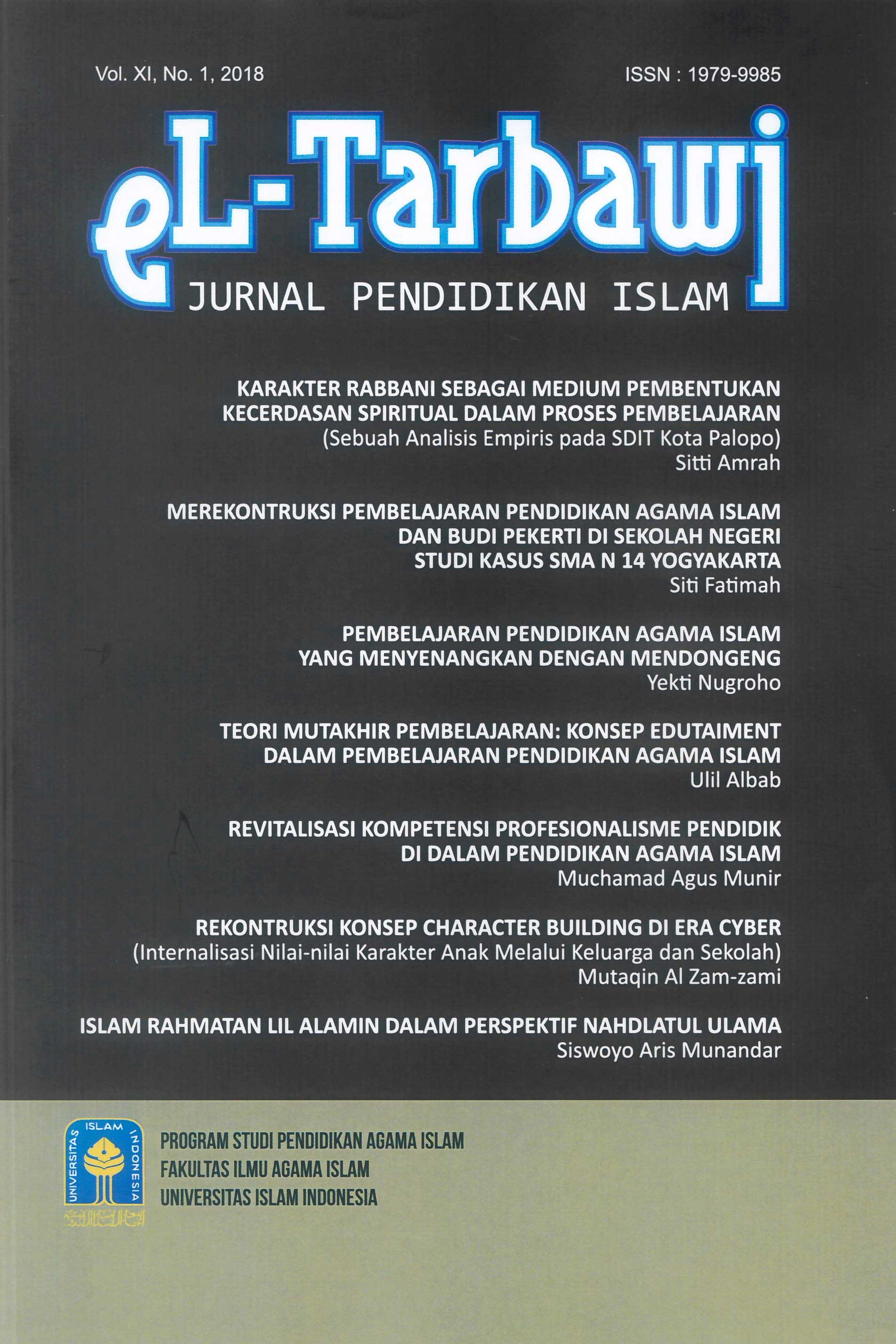Main Article Content
Abstract
This research tries to reformulate the meaning rather than education professionalism in Islamic religious education. The problem that has arisen lately is that educators are only limited to teaching and teaching knowledge to students, and only aborting obligations as teaching professional workers, so it cannot be denied, the quality of educators in PAI is very low in professionalism. Whereas in the PAI the meaning of educators is not only limited to that when viewed in terms of professionalism. There are words of Murabbi, Mu’allim, Muaddib, Mudarris, ahl-Zikr, who have concerns about their individual upbringing patterns. In particular the government has issued a law relating to the professionalism of education personnel, except that in practice many of the educators do not comply with these regulations. The results of this study indicate that Islamic religious education needs to revitalize the professionalism of educators, through the reinterpretation of the concept of educators and combined with government regulations on professionalism. Educators need the creativity of the elements of education, mastery of students, and guidance so that students can develop their potential. Thus the professionalism of educators can be run well.
Keywords: Revitalization, Professionalism Competence, Educators, Islamic Education
Article Details
Authors retain copyright and grant the journal right of first publication with the work simultaneously licensed under a Creative Commons Attribution (CC-BY-SA) 4.0 License that allows others to share the work with an acknowledgment of the work’s authorship and initial publication in this journal.
References
- Abduhzen, Mohammad. Selasa, 2 Juni 2013. “Guru Generasi Baru”. Kompas.
- Al-Attas, Syed Muhammad Naquib. (1992). Konsep Pendidikan dalam Islam. Bandung: Mizan.
- An-Nahlawi, Abdurrahman. (1996) Pendidikan Islam di Rumah, Sekolah, dan Masyarakat. Terj. Sihabbudin. Jakarta: Gema Insani Press.
- Ashraf, Syed Sajjad Husain dan Syed Ali. (1994). Menyongsong Keruntuhan Pendidikan Islam. Bandung: Gema Risalah Press.
- Assegaf, Abdurrahman. (2011). Filsafat Pendidikan Islam. Jakarta: Rajawali.
- Asmu’in, Saiful Bahri. (1997). “Menghargai Profesi Guru”. Rindang. No. 8. Th XXII.
- Asy-Shiddieqy, TM. Hasbi. (1977). Tafsir al-Bayan. Bandung: al-Ma’arif.
- Asy-Syaibany, M. Omar al-Toumy. (1979). Falsafah Pendidikan Islam, terj. Hasan Langgulung. Jakarta: Bulan Bintang.
- Bukhori, Mochtar. (1994). Pendidikan dalam Pembangunan. Jakarta: IKIP Muhammadiyah Press.
- Danim, Sudarman. (2012). Pengembangan Profesi Guru, dari Pra-jabatan Induksi ke Profesional Madani. Jakarta: Kencana.
- Daud, Wan Mohd. (1998). Nor Wan. Filsafat dan Praktik Pendidikan Islam Syed M. Naquib al- Attas. Bandung: Mizan.
- Hamruni. (2008). Konsep Edutaintment dalam Pendidikan Islam. Yogyakarta: Suka Press.
- Kunandar. (2007). Guru Profesional: Implementasi Kurikulum Tingkat Satuan Pendidkan Dan Sukses Dalam Sertifikasi Guru. Jakarta: Raja Grafindo Persada.
- Marimba, Ahmad D. (1980). Pengantar Filsafat Pendidikan Islam. Bandung: N.V. Al-Ma’arif.
- Nizar, Ramayulis dan Samsul. (2009). Filsafat Pendidikan Islam: Telaah sistem Pendidikan dan Pemikiran Para Tokohnya. Jakarta : Kalam Mulia.
- Nuryatno, M. Agus. (2011). Mazhab Pendidikan Kritis menyingkap Relasi Pengetahuan Politik dan Kekuasaan. Yogyakarta: Resist Book.
- Ridha, Muhammad Jawwad. (2002). Tiga Aliran Utama Teori Pendidikan Islam, Perspektif Sosiologi-Filosofis. Terj. Mahmud Arif. Yogyakarta: Tiara Wacana.
- Sahil, Azharuddin. (2007). Indeks Al-Qur’an Panduan Mudah Mencari Ayat dan Kata dalam Al- Qur’an. Bandung: Mizan.
- Shihab, Quraish. (2002). Tafsir Al-Misbah, vol. 1. Jakarta: Lentera Hati.
- Sobur, Alex. (2001). Etika Pers Profesionalisme Dengan Nurani. Bandung: Humaniora Utama Press.
- Suseno, Franz Magnis. (1992). Berfilsafat dari Konteks. Yogyakarta: Kanisius.
- Tafsir, Ahmad. (2008). Ilmu Pendidikan Islami. Bandung: PT. Remaja Rosdakarya.
- Tedjosaputro, Liliana. (1995). Etika Profesi Notaris dalam Penegakan Hukum Pidana. Yogyakarta: Bigraf Publishing.
- Undang-Undang, No. 14, Tahun 2015, Tentang Guru dan Dosen.
- Usman, M. Uzer. (2002). Menjadi Guru Profesional. Bandung: Remaja Rosdakarya.
References
Abduhzen, Mohammad. Selasa, 2 Juni 2013. “Guru Generasi Baru”. Kompas.
Al-Attas, Syed Muhammad Naquib. (1992). Konsep Pendidikan dalam Islam. Bandung: Mizan.
An-Nahlawi, Abdurrahman. (1996) Pendidikan Islam di Rumah, Sekolah, dan Masyarakat. Terj. Sihabbudin. Jakarta: Gema Insani Press.
Ashraf, Syed Sajjad Husain dan Syed Ali. (1994). Menyongsong Keruntuhan Pendidikan Islam. Bandung: Gema Risalah Press.
Assegaf, Abdurrahman. (2011). Filsafat Pendidikan Islam. Jakarta: Rajawali.
Asmu’in, Saiful Bahri. (1997). “Menghargai Profesi Guru”. Rindang. No. 8. Th XXII.
Asy-Shiddieqy, TM. Hasbi. (1977). Tafsir al-Bayan. Bandung: al-Ma’arif.
Asy-Syaibany, M. Omar al-Toumy. (1979). Falsafah Pendidikan Islam, terj. Hasan Langgulung. Jakarta: Bulan Bintang.
Bukhori, Mochtar. (1994). Pendidikan dalam Pembangunan. Jakarta: IKIP Muhammadiyah Press.
Danim, Sudarman. (2012). Pengembangan Profesi Guru, dari Pra-jabatan Induksi ke Profesional Madani. Jakarta: Kencana.
Daud, Wan Mohd. (1998). Nor Wan. Filsafat dan Praktik Pendidikan Islam Syed M. Naquib al- Attas. Bandung: Mizan.
Hamruni. (2008). Konsep Edutaintment dalam Pendidikan Islam. Yogyakarta: Suka Press.
Kunandar. (2007). Guru Profesional: Implementasi Kurikulum Tingkat Satuan Pendidkan Dan Sukses Dalam Sertifikasi Guru. Jakarta: Raja Grafindo Persada.
Marimba, Ahmad D. (1980). Pengantar Filsafat Pendidikan Islam. Bandung: N.V. Al-Ma’arif.
Nizar, Ramayulis dan Samsul. (2009). Filsafat Pendidikan Islam: Telaah sistem Pendidikan dan Pemikiran Para Tokohnya. Jakarta : Kalam Mulia.
Nuryatno, M. Agus. (2011). Mazhab Pendidikan Kritis menyingkap Relasi Pengetahuan Politik dan Kekuasaan. Yogyakarta: Resist Book.
Ridha, Muhammad Jawwad. (2002). Tiga Aliran Utama Teori Pendidikan Islam, Perspektif Sosiologi-Filosofis. Terj. Mahmud Arif. Yogyakarta: Tiara Wacana.
Sahil, Azharuddin. (2007). Indeks Al-Qur’an Panduan Mudah Mencari Ayat dan Kata dalam Al- Qur’an. Bandung: Mizan.
Shihab, Quraish. (2002). Tafsir Al-Misbah, vol. 1. Jakarta: Lentera Hati.
Sobur, Alex. (2001). Etika Pers Profesionalisme Dengan Nurani. Bandung: Humaniora Utama Press.
Suseno, Franz Magnis. (1992). Berfilsafat dari Konteks. Yogyakarta: Kanisius.
Tafsir, Ahmad. (2008). Ilmu Pendidikan Islami. Bandung: PT. Remaja Rosdakarya.
Tedjosaputro, Liliana. (1995). Etika Profesi Notaris dalam Penegakan Hukum Pidana. Yogyakarta: Bigraf Publishing.
Undang-Undang, No. 14, Tahun 2015, Tentang Guru dan Dosen.
Usman, M. Uzer. (2002). Menjadi Guru Profesional. Bandung: Remaja Rosdakarya.
